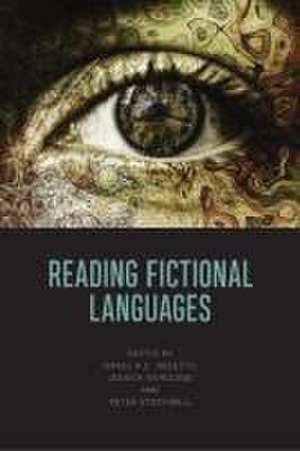Reading Fictional Languages
Editat de Israel Noletto, Jessica Norledge, Peter Stockwellen Limba Engleză Hardback – 6 dec 2023
Preț: 523.51 lei
Preț vechi: 641.40 lei
-18% Nou
Puncte Express: 785
Preț estimativ în valută:
100.17€ • 104.85$ • 83.38£
100.17€ • 104.85$ • 83.38£
Carte tipărită la comandă
Livrare economică 31 martie-14 aprilie
Livrare express 21-27 februarie pentru 62.47 lei
Preluare comenzi: 021 569.72.76
Specificații
ISBN-13: 9781399529143
ISBN-10: 1399529145
Pagini: 272
Ilustrații: 26 Illustrations, black and white
Dimensiuni: 156 x 234 x 16 mm
Greutate: 0.53 kg
Editura: EDINBURGH UNIVERSITY PRESS
ISBN-10: 1399529145
Pagini: 272
Ilustrații: 26 Illustrations, black and white
Dimensiuni: 156 x 234 x 16 mm
Greutate: 0.53 kg
Editura: EDINBURGH UNIVERSITY PRESS
Notă biografică
Israel A.C. Noletto is Professor of English Language and Literature at the Federal Institute of Piauí (IFPI), Brazil. He holds a PhD in Language and Literature from the Federal University of Piauí and has been a CAPES fellow at the University of Nottingham. He is interested in literary stylistics, narrative theory and fictional languages in science fiction as a literary phenomenon and has authored several scholarly articles on glossopoesis in writers ranging from George Orwell to Ted Chiang, Jonathan Swift to Anthony Burgess, Thomas More to Suzette Haden Elgin. He has co-edited Literatura, Memória e Cultura (2021), and Ensaios sobre teoria e crítica literária (Essays on Literary Theory and Criticism) (2020), a collection of papers on literary criticism by scholars from Brazil, Nigeria and Nepal.
Jessica Norledge is Assistant Professor in Stylistics at the University of Nottingham. Her research sits at the interface between English literature and English language, in stylistics and narratology. Jess has a particular interest in the style of dystopian literature and the experience of reading dystopian narratives, ranging from early utopian works through to 21st-century literary practice. She has published on the cognitive poetics of emotion, dystopian epistolary, unnatural and non-human minds, and worlds theories in dystopian fiction. Her books include The Language of Dystopia (2022), and the co-authored Digital Teaching for Linguistics (2022).
Peter Stockwell is Professor of Literary Linguistics at the University of Nottingham, and a Fellow of the English Association. He has published 20 books and 100 articles in stylistics, sociolinguistics, science fiction and applied linguistics, including Cognitive Poetics (2020), The Language of Surrealism (2017), Texture: A Cognitive Aesthetics of Reading (Edinburgh University Press, 2009), and The Poetics of Science Fiction (2000). He co-edited The Cambridge Handbook of Stylistics (2014), The Language and Literature Reader (2008), Contemporary Stylistics (2007) and Impossibility Fiction (1996). His work in cognitive poetics has been translated into many languages, including Arabic, Chinese, Japanese, Polish, Persian, Russian and Arabic.
Jessica Norledge is Assistant Professor in Stylistics at the University of Nottingham. Her research sits at the interface between English literature and English language, in stylistics and narratology. Jess has a particular interest in the style of dystopian literature and the experience of reading dystopian narratives, ranging from early utopian works through to 21st-century literary practice. She has published on the cognitive poetics of emotion, dystopian epistolary, unnatural and non-human minds, and worlds theories in dystopian fiction. Her books include The Language of Dystopia (2022), and the co-authored Digital Teaching for Linguistics (2022).
Peter Stockwell is Professor of Literary Linguistics at the University of Nottingham, and a Fellow of the English Association. He has published 20 books and 100 articles in stylistics, sociolinguistics, science fiction and applied linguistics, including Cognitive Poetics (2020), The Language of Surrealism (2017), Texture: A Cognitive Aesthetics of Reading (Edinburgh University Press, 2009), and The Poetics of Science Fiction (2000). He co-edited The Cambridge Handbook of Stylistics (2014), The Language and Literature Reader (2008), Contemporary Stylistics (2007) and Impossibility Fiction (1996). His work in cognitive poetics has been translated into many languages, including Arabic, Chinese, Japanese, Polish, Persian, Russian and Arabic.
